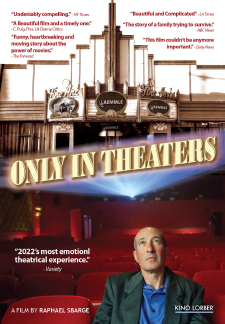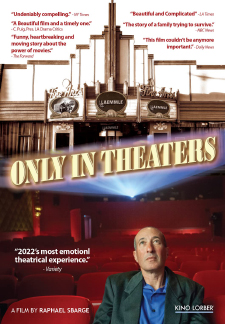Only in Theaters (DVD Review)

Director
Raphael SbargeRelease Date(s)
2022 (July 11, 2023)Studio(s)
Wishing Well Entertainment (Kino Lorber)- Film/Program Grade: A-
- Video Grade: A
- Audio Grade: A
- Extras Grade: B-
Review
Only in Theaters focuses on a family and its decades-long relationship to film. Carl Laemmle founded Universal Pictures in 1912 and a Laemmle has been in the film business ever since. This documentary tells the story of a small group of Los Angeles movie theaters founded by two nephews of Carl Laemmle, Sr. The job of running the business was turned over to Robert Laemmle, who then passed day-to-day operations to his son, Greg.
The Laemmle theaters are home to quality independent and foreign films. The family’s mission is to deliver film culture and build an audience for it. Business isn’t great and Greg Laemmle struggles to both feed his family and keep the theaters afloat, so he feels forced to sell. Knowing that he would be the one to break a long-standing tradition linking the Laemmles with film causes him and his family great stress.
The Laemmles were the first in the area to show films by directors Francois Truffaut and Ingmar Bergman, and even invited them home for meals when they were in town. The theaters survived competition from TV, cable TV, home video, streaming and national tragedies, but now the end looks inevitable. Yet Greg vacillates and finally decides not to sell.
Then the coronavirus hits and theaters close for ten months. Greg realizes he could have avoided this had he gone ahead and sold. He sells his home in Los Angeles, moves to Seattle, and sells two of the theaters, hoping every day that the lockdown will soon end and the remaining Laemmle theaters will be able to reopen.
Filmmaker Ava DuVernay, film critics Leonard Maltin and Kenneth Turan, 103-year-old Alyse Laemmle, journalist Cameron Crowe, production designer David Snyder, academician Michael Reno, TV director Roger Christensen and others offer their insights into the significance of the Laemmle theaters and the family’s dedication to quality cinema. Often, their testimonials emphasize that seeing a movie in a theater with an audience is a transformative experience.
The story becomes quite personal as Greg’s supportive wife, Tish, and their three grown sons express their hope for him to have a stress-free life with promising new opportunities instead of constantly worrying about how the business can support them and whether he would be letting down L.A.’s film community by abandoning an 80-year-old cultural mission. At one point, Greg says that he’s not wise enough “to find that balance between pursuit of perfection and acceptance of where you are, so that’s my challenge, to find that spot.” As guardian of the family legacy, Greg bears a heavy weight.
Director Raphael Sbarge cleverly keeps us in suspense, so that we never know exactly how things will turn out. The outlook is often poor but there are hopeful moments. Greg Laemmle is fighting a Herculean battle against tough obstacles. Will he overcome them or will they overcome him? Los Angeles residents may be more aware of the background of the events portrayed in the documentary but themes resonate far beyond the city of angels. It’s a tale of dedication, family, tradition, tribulation, legacy, changing times, and survival.
Only in Theaters was shot digitally by director of photography Matt Kubas and presented in the widescreen aspect ratio of 2.35:1. Archival footage and brief clips from independent motion pictures are interspersed with new footage and interviews. A few shots of audiences watching a film on a large screen in a theater represent the ideal way to watch a movie, according to the documentary.
There are two soundtrack options, English 5.1 Surround and 2.0 Stereo. Interviews are clear and distinct, with many interviewees enthusiastic about the importance of the Laemmle theaters in making available to audiences films they otherwise might not see.
Bonus materials include the following:
- Audio Commentary by Raphael Sbarge
- Alternate Opening Sequence (2:18)
- Roger Christensen Interview (15:27)
- Cameron Crowe Interview (10:55)
- Ava DuVernay Interview (9:57)
- Alyse Laemmle Interview (15:23)
- Leonard Maltin Interview (9:51)
- Michael Reno Interview (11:36)
- Bruce Joel Rubin Interview (16:00)
- David Snyder Interview (4:11)
- Kenneth Turan Interview (13:02)
- Isaac Wade Interview (5:18)
- Theatrical Trailer (2:10)
Audio Commentary – Director Raphael Sbarge had no idea where the story of his documentary would end. Events evolved unforeseeably during the making of the film, so he went ahead “completely on instinct.” “This is a family that communicates through film.” Sbarge briefly mentions how Carl Laemmle got into the film business, which is also the story of an immigrant coming to America and achieving success. When the Nazis came to power in his native Germany, Carl Laemmle used his resources to get 300 families into the United States, making him “a sort of Schindler.” Those he brought over included William Wyler, who became an Academy Award-winning director. To introduce film culture to Hollywood, Max Laemmle exhibited foreign films and built audiences for directors such as Ingmar Bergman and Francois Truffaut. Promoting the art of film became the Laemmle family’s mission. Sbarge wonders if his documentary is a “hero’s journey” because it follows Greg’s personal mission to survive and preserve a life’s work while being tested with numerous obstacles. Movie theaters amplify the emotional level of a film. Editing provided depth and dimension to the story of the Laemmles by highlighting the intimacy of the family that cares about film and is struggling in a difficult time. Referring to Greg Laemmle, Sbarge notes, “You can’t find anyone more committed than Greg.”
Alternate Opening Sequence – This sequence, in black and white, shows Greg Laemmle having breakfast, riding to work on his bicycle, and heading up the stairs at one of his theaters to the company office where he begins his work day. The narration, by Greg, talks about the Jewish tradition of survival.
Some documentaries have finite conclusions. All the events are known and are part of history. Only in Theaters does not presume to predict what the future will hold for the Laemmles and their beloved theaters. Film is art and art should be presented in the best possible format and setting. The documentary makes a strong case that movie theaters are that place.
- Dennis Seuling

